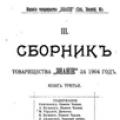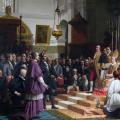What is Derzhavin’s service to Russian literature? Own path in literature
Portrait of 1811
V.L. Borovikovsky
Gabriel Romanovich Derzhavin born on July 14 (July 3, old style) 1743 on a family estate in the village of Sokury in the Kazan province (now the village of Sokury, Republic of Tatarstan, Russian Federation) into a poor noble family. Father, Roman Nikolaevich, was an officer and his family often moved from one duty station to another. In 1750, Gabriel Romanovich began studying at a German boarding school in Orenburg. In 1754, after resigning, the father dies, and the family finds itself in a difficult financial situation. Mother, Fekla Andreevna, decides to move to Kazan. And in 1759 Derzhavin entered the Kazan gymnasium, which he successfully graduated from in 1762. During his studies, Gabriel Romanovich was one of the best students.
After his studies, Derzhavin began his military service with the rank of private in the Preobrazhensky Regiment. In the same 1762, he took part in the palace coup and the ascension to the throne of Catherine II. During his service he took part in the suppression of the Pugachev uprising. During the service, he begins to write poetry, which was first published in 1773.
He retired with the rank of officer in 1777 and, with the help of Prince Vyazemsky, got a job in the Senate. In 1778 he married Ekaterina Yakovlevna Bastidon (1761-1794). In 1782, after the publication of the ode “Felicia”, praising Catherine, Derzhavin became known as a poet. In 1783 he became a member of the newly created Imperial Russian Academy. In 1784, after a conflict with Prince Vyazemsky, he resigned. In the same year, Catherine II appointed Derzhavin as ruler of the Olonets governorship (since 1801, Olonets province). Here he participated in the creation of administrative institutions. And since 1786 he has served as the ruler of the Tambov governorship, where he also proves himself to be a good leader, leaving a noticeable mark on the history of the region. In 1791 he became Secretary of State of Catherine II. And two years later, in 1793, he was appointed senator. In 1794, Derzhavin’s wife dies and six months later he marries Daria Alekseevna Dyakova for the second time. From 1802 to 1803 he was Minister of Justice. In 1803 he was dismissed. Throughout his military and public service, he often came into conflict because of his love for the truth and his ardor, for which he was not loved.
The time of public service was the dawn of his talent, and his fame grew. After leaving service, he constantly lives on his Zvanka estate in the Novgorod province and continues to study literature. In 1811, together with Alexander Semenovich Shishkov, he created the literary community “Conversation of Lovers of the Russian Word.”
Gabriel Romanovich Derzhavin died on July 20, 1816 on his estate. He was buried in the Transfiguration Cathedral of the Varlaamo-Khutyn Monastery near Veliky Novgorod.
Despite the fact that the basis of Gavrila Derzhavin’s work is Russian classicism, it significantly went beyond its limits. Derzhavin's poems are characterized by a combination of “high” and “low” elements, a mixture of solemn ode with satire, colloquial expressions along with Church Slavonic vocabulary. A romantic approach to reality also creeps into the poet’s works. In other words, Derzhavin’s work expressed the entire development path of Russian literature of this era - from classicism, through sentimentalism and romanticism to realism.
The poet considers truth to be the basis of art, which artists and poets are obliged to convey to the reader. The task of art is to imitate nature, that is, objective reality. But this does not apply to the base and rough sides of life - poetry, as Derzhavin believes, should be “pleasant.” It should also be useful - this explains the numerous moral teachings, satires and morals with which the poet’s work is replete.
Derzhavin, of course, could not pretend to be a spiritual people's leader and encroach on the foundations of autocracy, but in many works he expresses precisely the people's point of view, which was already a breakthrough for Russian literature of the 18th century. Thus, the impressions of Pugachev’s peasant war were reflected in all the poet’s most important poems - from “Chitalagai Odes” to “Nobleman” - in them he is on the side of the people, condemning their torment by landowners and nobles.
Since 1779, Derzhavin’s work has become more and more original - he follows his own path in poetry. Derzhavin’s merit to Russian poetry is the introduction of the “funny Russian style” into literature: a combination of high style with vernacular, satire and lyricism.
Derzhavin expands the themes of poetry, bringing it closer to life. He begins to look at the world and nature through the eyes of an ordinary earthly person. The poet depicts nature not abstractly, as was done before him, but as a living reality. If before Derzhavin nature was described in the most general terms: streams, birds, flowers, sheep, then in the poet’s poems details, colors, sounds already appear - he works with words, like an artist with a brush.
In depicting a person, the poet approaches a living portrait, which was the first step on the path to realism.
Derzhavin expands the boundaries of ode. In “Felitsa” the scheme established by Lomonosov is violated - this is already a plot poem, and not a set of statements by the author in connection with a solemn event. Derzhavin's most famous odes - “Felitsa”, “God”, “Vision of Murza”, “Image of Felitsa”, “Waterfall” - are plot works into which the poet introduces his thoughts and feelings.
Derzhavin's poems introduce the image of the author into poetry, introduce the reader to the personality of the poet - this is another of his discoveries. The works represent not an abstract, but a concrete person. The poet in Derzhavin's works is an incorruptible fighter for the truth.
Derzhavin’s poetic language is of great importance for the subsequent development of Russian literature. The poet had an excellent sense of folk speech. The poet's poems always contain rhetoric and oratorical intonations - he teaches, demands, instructs, and is indignant. Many of Derzhavin’s expressions became popular:
“Where there was a table of food, there is a coffin,” “I am a king, I am a slave, I am a worm, I am a god,” “The smoke of the Fatherland is sweet and pleasant to us,” etc.
The poet’s main merit was the introduction of “ordinary human words” into poetry, which was incredibly unexpected and new. The subject of poetry becomes ordinary human affairs and concerns.
Derzhavin's works had an influence on almost all poets of the late 18th and early 19th centuries, contributing to the advent of a new milestone in the development of Russian poetry.
Of course, Derzhavin’s contribution to the development of Russian literature and culture was significant. The ode “Felitsa” gave him popularity and, in modern terms, brought him to the forefront. This work was noticed by Empress Catherine II, which gave Derzhavin the opportunity to move up the career ladder. Soon he will become Minister of Justice. During the service, he will create a new genre in Russian literature - a philosophical ode, write the ode "God" and the ode "On the death of Prince Meshchersky." Next, Derzhavin will create the text of the unofficial first anthem of the Russian Empire, which also gave him fame among the population and secular society. He was able to combine ode (high style) and satire (low style) - which seems impossible (in other words, he brings ode down from heaven to earth). In the genre of "satiristic ode" Derzhavin will write an ode to "The Nobleman" and "To the Ruler and the Judges."
Destroying the foundations of classicism, Derzhavin gave rise to the development of a new artistic direction - realism. This is one of his most important achievements. Places the author's self above the norm.
Updated: 2017-03-24
Attention!
Thank you for your attention.
If you notice an error or typo, highlight the text and click Ctrl+Enter.
By doing so, you will provide invaluable benefit to the project and other readers.
What is Derzhavin’s service to Russian literature? and got the best answer
Answer from DINAmovets In spirit[guru]
Gavrila Romanovich Derzhavin is a great Russian poet of the late 18th century, one of the titans of the mighty Russian word, who played a huge role in the liberation of Russian literature from classicism and the formation of elements of the future realistic style. The poet’s place in Russian literature was very accurately defined by V. G. Belinsky: “With Derzhavin, a new period of Russian poetry begins, and just as Lomonosov was its first name, so Derzhavin was its second. In the person of Derzhavin, Russian poetry took a great step forward.” The historical merit of the poet is his introduction of the “ordinary poetic word” into poetry. Derzhavin became limited by the three styles established by Lomonosov. He removed them and, according to A.V. Zapadov, “thereby... introduced the Russian colloquial language into poetry and energetically contributed to strengthening the national-democratic foundations of our literary language.”
Derzhavin's civil odes are addressed to persons endowed with great political power: monarchs, nobles. In them the poet rises not only to laudatory, but also to accusatory pathos. In the ode “Felitsa,” Derzhavin the enlightener sees in the monarch a person to whom society has entrusted the care of the welfare of citizens, therefore the right to be a monarch imposes on the ruler numerous responsibilities in relation to the people. Derzhavin's innovation in this ode is not only in the interpretation of the image of an enlightened monarch, but also in the bold combination of laudatory and accusatory principles - ode and satire. This connection is a phenomenon of educational literature, because the enlighteners understood the life of society as a constant struggle between truth and error.
In the ode “The Nobleman” by Derzhavin, the evil arising from the indifference of the nobles to their duty is presented with such indignation, which can be traced only in some works of that time. The poet is outraged by the situation of the people suffering from the criminal attitude of the courtiers. In the poem “To Rulers and Judges,” the indifference and selfishness of those in power do not leave the poet indifferent, and he demands the punishment of the guilty. The poet reminds the kings that they are as mortal as their subjects, and sooner or later they will stand trial
God's. In Derzhavin's "Monument" there is a thought about the right of their authors to immortality. In this poem, the poet recalls that he was the first to dare to abandon the solemn pompous style of odes.
Derzhavin insisted on his human dignity and the independence of his judgment over modernity. With this, Derzhavin clarified the idea of the poet’s personal responsibility for his judgments, the idea of sincerity and truthfulness of his ideological propaganda, which is very important for the further development of advanced Russian literature. Derzhavin's predecessors - Kantemir, Lomonosov, Sumarokov - were also quite truthful and sincere when preaching their ideas. But they thought that what was important for the reader was not the opinion of the poet, but the universal evidence of his works, that the state itself or the truth itself spoke through their lips - and the value of these lofty ideas outweighed the question of the personal authority of the human poet.
Derzhavin wrote differently from his predecessors. He taught and judged people precisely as a poet and became an authority of a new ideological nature. Derzhavin is a monarchist. He protects his free authority as a citizen and feels that the autocracy is worsening it:
Fear bound in chains
And those born under the rod,
Is it possible with eagle wings
Should we soar towards the sun with our minds?
And when they flew,
We feel our yoke...
A slave cannot even praise
He can only flatter.
In 1796, Derzhavin, in an ode to the “Prince of Athens,” sang the praises of A. G. Orlov, who was in disgrace, and at the beginning of his ode emphasized the importance of independence and truthfulness of praise and condemnation in the poet’s work and in his own work.
Derzhavin was sincere in his praise and wanted readers to believe his sincerity. “Felitsa” - Catherine - he sang enthusiastically, she seemed like that to him from afar.
The poet Derzhavin Gabriel Romanovich was born on July 3 (July 14), 1743 in the Kazan province into a family of impoverished nobles. His childhood was spent on a family estate in the village of Sokury. Since 1759, Derzhavin studied at the Kazan gymnasium.
In 1762, the future poet entered service as an ordinary guardsman in the Preobrazhensky Regiment. In 1772 he was promoted to ensign, receiving his first officer rank. In 1773 - 1775, Derzhavin, as part of the regiment, participated in the suppression of the uprising of Emelyan Pugachev.
Civil service
Since 1777, Derzhavin entered the civil service in the Government Senate with the rank of state councilor. In 1784 - 1788 he held the post of ruler of the Olonetsky, and then the Tambov governorship. Even in a brief biography of Derzhavin, it is worth mentioning that he was actively involved in improving the economy of the region and contributed to the formation of provincial administrative, judicial and financial institutions.
In 1791, Derzhavin was appointed cabinet secretary of Catherine II. Since 1793, the poet has served as the empress's secret adviser. In 1795, Derzhavin received the post of president of the Commerce Collegium. From 1802 to 1803 he served as Minister of Justice.
last years of life
In 1803, Derzhavin retired and settled on his Zvanka estate in the Novgorod province. The poet devotes the last years of his life to literary activity. In 1813, Derzhavin, whose biography was full of trips even during this period, went to Ukraine to visit V.V. Kapnist. In 1815, he attended an exam at the Tsarskoye Selo Lyceum, listening to the works of the young Alexander Pushkin.
On July 8 (July 20), 1816, Gabriel Romanovich Derzhavin died on his estate. The poet was buried in the Transfiguration Cathedral of the Varlaamo-Khutyn Monastery near Veliky Novgorod.
Creation
The work of Gabriel Derzhavin is considered the pinnacle of Russian classicism. The poet's first works appeared during his military service. In 1773, Derzhavin made his debut in the magazine “Antiquity and Novelty” with a translation of the passage “Iroizha, or Letters of Vivlida to Kavno” from the works of Ovid. In 1774, the works “Ode on Greatness” and “Ode on Nobility” saw the light of day.
In 1776, the poet’s first collection of poems, “Odes Translated and Composed at Mount Chitalagoe,” was published.
Since 1779, Derzhavin has been moving away from the traditions laid down by Sumarokov and Lomonosov, working on philosophical lyrics. In 1782, the ode “Felitsa” was published, dedicated to Empress Catherine II, which brought the poet wide literary fame. Soon other famous works of Derzhavin appeared - “The Nobleman”, “Eugene. Life of Zvanskaya”, “On the Death of Prince Meshchersky”, “God”, “Dobrynya”, “Waterfall”, “Herod and Mariamne”, etc.
In 1808, a collection of Derzhavin’s works was published in four volumes.
Chronological table
Other biography options
- The Derzhavin family originates from the son of the Tatar Murza Bagrim, who bore the name Derzhava.
- The first wife of G.R. Derzhavin was Ekaterina Bastidon, the daughter of the Portuguese Bastidon, the former valet of Peter III.
- Derzhavin studied German from the age of seven, read Klopstock, Gellert, Kleist, Haller, Gagedorn in the original, which significantly affected his literary work.
- Derzhavin’s poem “The Thunder of Victory, Ring Out!”, created in 1791, became the first unofficial anthem of Russia.
- For distinguished service in public service, Gavriil Romanovich Derzhavin was awarded the Order
 “The moral quest of Kuprin’s heroes using the example of the heroes of the story “The Duel”
“The moral quest of Kuprin’s heroes using the example of the heroes of the story “The Duel” Poems by Robert Rozhdestvensky
Poems by Robert Rozhdestvensky Where and when did the Cortes appear in Spain?
Where and when did the Cortes appear in Spain?